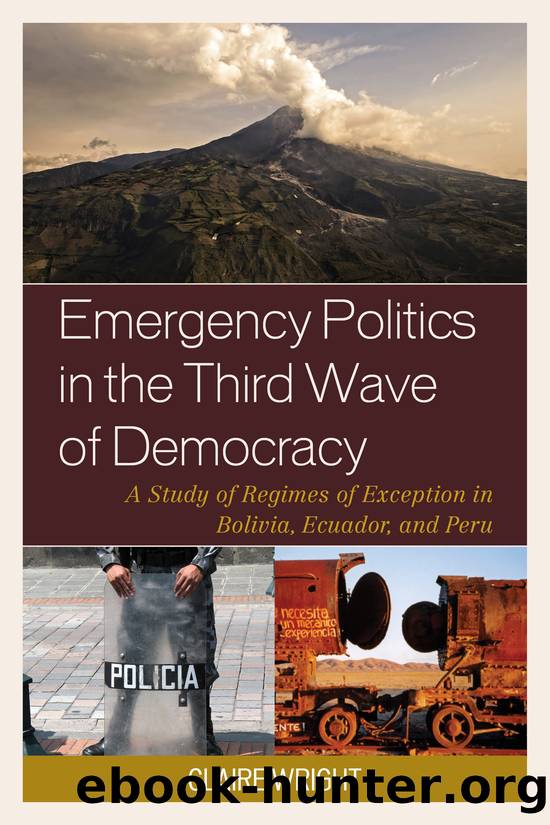Emergency Politics in the Third Wave of Democracy by Wright Claire;

Author:Wright, Claire;
Language: eng
Format: epub
Publisher: Lexington Books
Chapter 5
Ecuador
The Administrative Paradigm
In a personal interview carried out by the author in Quito in July 2010, a political economist referred to a duality in the nature of regimes of exception in Ecuador: âIn Ecuador, the state of emergency has been used . . . with different visions: a fiscal vision to overcome contracting procedures for public works and another vision to control conflict.â
With this duality in mind, the following pages are dedicated to revising the use of regimes of exception in Ecuador in recent years, charting how the repressive emergency politics paradigm has in this case been surpassed by the administrative emergency politics paradigm. As will become clear, this constitutes a tendency that began toward the end of the 1990s and which became firmly established in the context of President Rafael Correaâs Revolución Ciudadana or âCitizen Revolution.â1 As a resultâand as will be demonstrated throughout this chapterâthe locus of concern over the impact of regimes of exception on democratization efforts has moved largely from the protection of civil rights to the need for transparency over the use of public resources and the adjudication of public contracts, as well as the continuing role of the military in the face of important questions of political legitimacy.
The primary sources used in this study are the declarations of regimes of exception issued between 2000 and 2010,2 together with the relevant legal frameworks: the Constitution of 1998 with its âstate of emergencyâ and the Constitution of 2008 with its âstate of exception.â Crucially, these legal developments are of secondary interest to the study and are important to the extent that they help to shape the use of regimes of exception in practice and indeed reflect new opinions and agreements about the mechanisms. One of the justifications for the empirical approach in this volume is that the imagined powers of regimes of exception can be just as important as those powers formally established in normative frameworks. Finally a whole wealth of sources is used to complete the analysis, including reports and bulletins,3 in-depth interviews with key-informants,4 and newspaper articles.5
The chapter is structured as follows: first of all, a starting point is established, in which historical tendencies and relevant normative frameworks prior to 2000 are identified; next, an in-depth analysis is offered of regimes of exception as they have been used in practice in Ecuador between 2000 and 2010; and finally, an ending point is established, offering an overview regarding developments in regimes of exception in practice and changes or continuities at the formal level. In parallel with the chapters on Peru and Bolivia, this final section offers some reflections on the relationship between regimes of exception and democratic governability in Ecuador, taking into account possible trade-offs between legitimacy and efficiency.
The Starting Point: Historical Use and Legal Frameworks Prior to 2000
As established in Chapter 2, the processes of independence from colonial rule in Latin America were fraught with violence, conflict, and antipolitics led by soldiers and caudillos (Loveman 1993). Similarly to the political development of Peru
Download
This site does not store any files on its server. We only index and link to content provided by other sites. Please contact the content providers to delete copyright contents if any and email us, we'll remove relevant links or contents immediately.
| Africa | Americas |
| Arctic & Antarctica | Asia |
| Australia & Oceania | Europe |
| Middle East | Russia |
| United States | World |
| Ancient Civilizations | Military |
| Historical Study & Educational Resources |
Machine Learning at Scale with H2O by Gregory Keys | David Whiting(3663)
Never by Ken Follett(3550)
Fairy Tale by Stephen King(2973)
The Man Who Died Twice by Richard Osman(2823)
Oathbringer (The Stormlight Archive, Book 3) by Brandon Sanderson(2657)
Will by Will Smith(2595)
Rationality by Steven Pinker(2159)
The Dark Hours by Michael Connelly(2092)
The Dawn of Everything: A New History of Humanity by David Graeber & David Wengrow(2023)
Friends, Lovers, and the Big Terrible Thing by Matthew Perry(2018)
Can't Hurt Me: Master Your Mind and Defy the Odds - Clean Edition by David Goggins(2012)
Principles for Dealing With the Changing World Order: Why Nations Succeed and Fail by Ray Dalio(1903)
HBR's 10 Must Reads 2022 by Harvard Business Review(1703)
A Short History of War by Jeremy Black(1679)
Go Tell the Bees That I Am Gone by Diana Gabaldon(1602)
515945210 by Unknown(1525)
443319537 by Unknown(1400)
Kingdom of Ash by Maas Sarah J(1396)
A Game of Thrones (The Illustrated Edition) by George R. R. Martin(1377)
